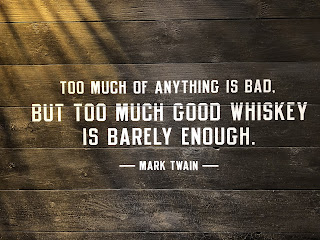I immediately recognize the expression when I come into the whiskey aisle: A customer is standing back, just staring at the wall of bottles in front of them. Furrowed brow. Befuddlement. Angst.
I am the certified Spirits Professional for the local location of a large national chain wine and spirits store. My job, essentially, is to work with customers who need some advice, want to talk spirits or - like the person in front of me - are completely at a loss.
“Can I help you?” I ask. I get a relieved expression almost immediately.
“Yes, if you don’t mind. I’m looking for a (fill in the blank) present for (fill in the blank…husband, wife, friend, boss). All I know is he/she/they like whiskey.”
Does the customer know a brand their target likes?
Have they seen this person order a cocktail?
And so on.
I explain that the term whiskey - or in some countries whisky - is an umbrella term, referring to a handful of specific categories.
Kind of like Red Wine can be a Cabernet Sauvignon, a Merlot, a Zin, etc.
In the case of whiskey/whisky, the term can refer to anything from Scotch to Bourbon, to Rye, to Canadian/Irish/American/Japanese whiskies amid others.
What distinguishes each usually comes from the core ingredients and how those ingredients are combined to make the basic recipe for fermentation followed by distillation.
Think of fermentation as the point where nature naturally takes a starch or sugar through the process that creates alcohol, resulting in products like beer or wine. The process of creating beer and wine is essentially guiding the fermentation to make the desired drink.
Distillation, on the other hand, is a man-made process that takes that natural process and follows it by heating the natural product to the point where the alcohol separates from the original fermentation and gives the resulting liquid a much higher alcohol content. Essentially turning beer into whiskey and wine into brandy, for example.
Whiskey is a distilled product, and follows specific guidelines set up by the governing boards and governments of each region of production.
Scotch, for example, must come from Scotland. Bourbon from the United States (not just Kentucky, which is a common misperception). Japanese, Canadian, Irish, Indian, etc, are self-explanatory.
So, Bourbon must be 51% or more corn, and usually you’ll find wheat, rye or other grains in the other 49%. A Rye must be 51% rye, with the other 49% variable.
Scotch comes in several categories. For a single malt Scotch the only ingredient is malted barley. (Malted simply means that the barley germinates slightly and then cooked to create the basis for the fermentation process.) A single malt must come from a single distillery.
Irish whiskey can use several combinations of malted grains and cereals to get their desires taste. And so on throughout other countries and regions.
All of which can be confusing and intimidating for consumers who may not themselves drink, or don’t drink the item in question. Wine drinkers may have no idea what makes a good Scotch selection, and Bourbon drinkers might be completely lost facing a wall of Pinot Noir.
Back to the customer in question.
What I’ve found is that often the best approach, particularly if the customer is unable to provide anything of substance, is to find something “interesting” as their gift. Instead of simply grabbing, for example, a favorite Bourbon and telling the customer “this will be good,” the best approach is to help them locate a bottle with a particularly resonating story or in some way a bottle that covers several bases at once.
Usually I get some direction. One person even made the comment to me that their target likes old western movies, making a bottle of Duke’s Bourbon a perfect go-to. Another offered up that their corporate headquarters is in Maryland, and this was a going-away gift to a coworker who was relocating. I suggested a bottle of Sagamore Spirits rye. Typically I wouldn’t go to ryes as an option - it’s a very distinctive and smokey drink, with less of a unreal appeal. But in this case, telling the customer that Sagamore is championing the Maryland style of rye and giving the customer a story to go along with the gift.
In each case, I work with the customer to find a compelling reason behind their purchase. It’s not just a random bottle, that their gift should have some logic behind it.
The feedback I get suggests I’m on the right track, particularly when it comes to corporate gifts when the person doesn’t necessarily socialize outside of the office. Finding an appropriate bottle isn’t just grabbing your own favorite brand, or a random bottle because you saw an ad for it in last month’s Travel and Leisure, it’s finding a gift bottle with resonance and lets the person you’re purchasing it for know that some thought and consideration were put into the selection.
Buying a gift of a wine or spirits is a common occurrence, but often leaves the buyer feeling like a fish out of water.
Find yourself a knowledgable person to help you out. Don’t be afraid to ask. Go to a specialty store, not your local supermarket or corner liquor store where the cashier is behind plexiglass. Seek out a good selection with knowledgable employees.
True wine and spirit merchants are more than happy to pass on a little knowledge and help you select a perfect gift.
Cheers!







Comments
Post a Comment